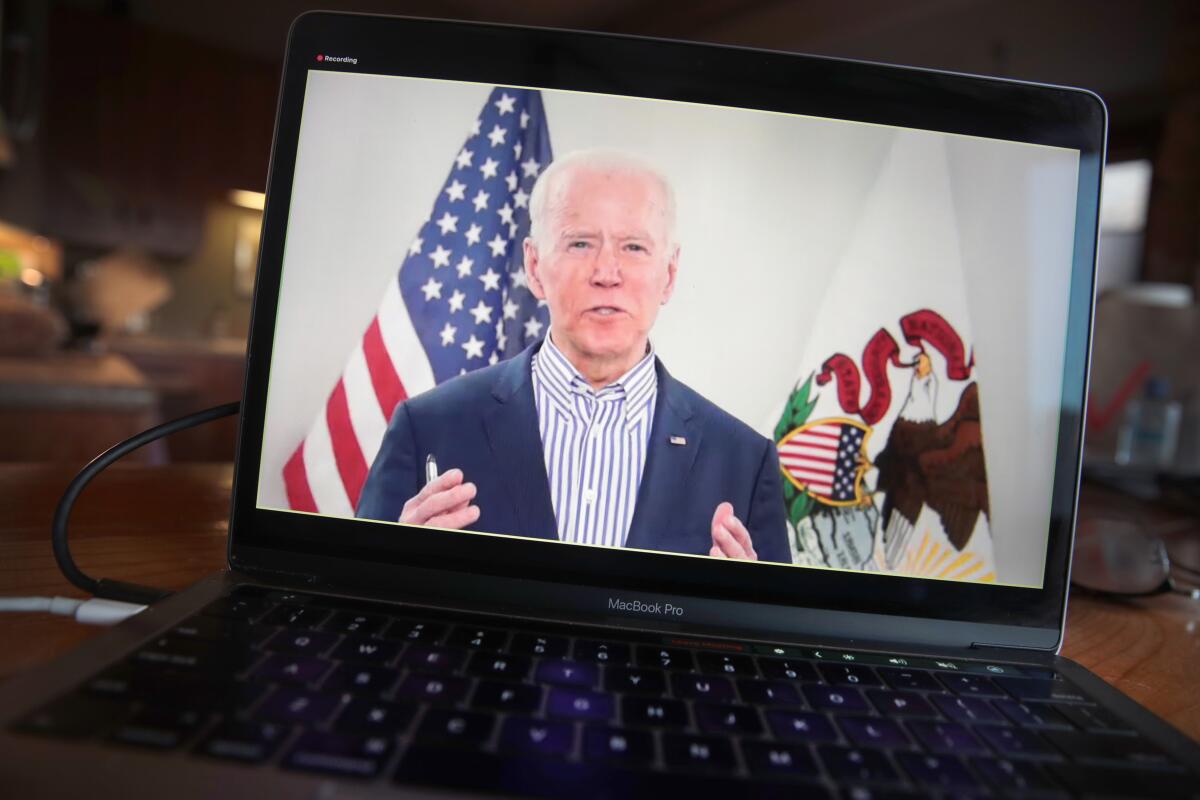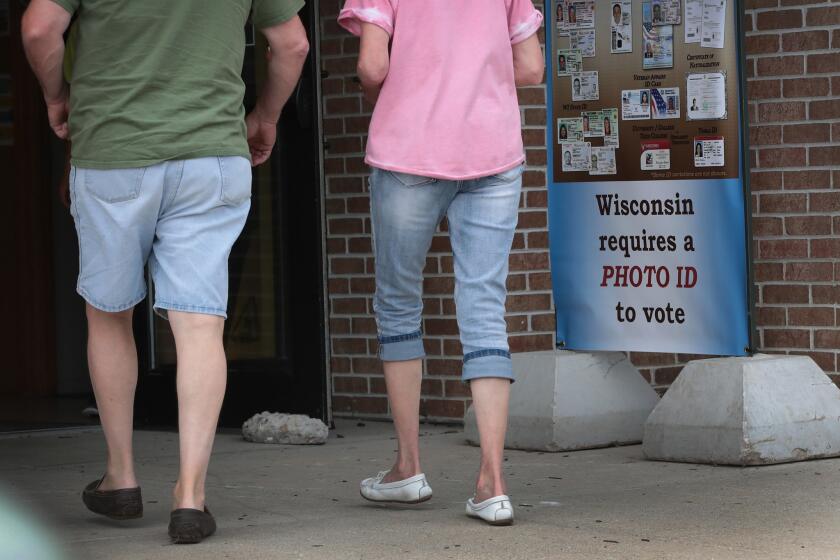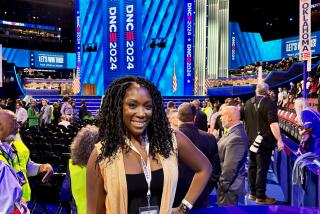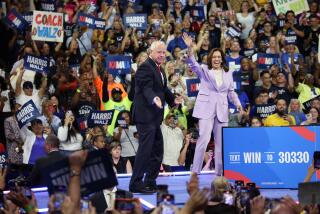Can’t knock on voters’ doors, maybe tap their avatars? Politicos scramble to adapt to coronavirus

WASHINGTON — A major election is approaching, college campuses are deserted and Democratic activists seeking to register young voters can’t walk up to any actual human beings.
So they are turning to avatars.
Activists at NextGen America, a Democratic super PAC, are scoping out virtual worlds — video games like Animal Crossing and Minecraft — as they seek to engage idle college students and other Gen Zers in one-on-one conversations about the real-world pursuit of voting.
“We are interested in any virtual world where you can walk up to people and ask, ‘hey are you registered?’ just like you would in the physical world,” said Ben Wessel, executive director of the group. “We are letting the creativity of the generation direct us.”
Digital experimentation is playing out at unprecedented scale right now as political operatives try to pull off a massive pivot in the way presidential campaigns are run. A lethal virus has made obsolete the door-to-door solicitations and candidate rallies that defined election seasons for decades, so presidential campaigns and groups backing them are racing to innovate.
June 2 has now replaced April 28 as one of the biggest days in the Democratic presidential primary.
“This is the fastest we have ever had to change as a society, both psychological and practical,” said Andrew Bleeker, who led digital marketing for Barack Obama’s presidential campaigns and is now president of the firm Bully Pulpit Interactive. “We don’t even gear up for wars this fast. … It is going to breed innovation.”
The vast armies of sidelined door knockers are being put to work finding potential voters virtually. Ad makers who would normally be out filming the candidates at big events are now rewriting their playbook for clients in lockdown.
In the most high-profile impact yet, the Democratic National Committee announced Thursday that it would postpone the party’s national presidential-nominating convention in Milwaukee from mid-July until the week of August 17, to allow more time to determine “the most appropriate structure” for an event that could end up going virtual if large public gatherings are still a public health hazard in late summer.
“We are going to end up with something that looks very different and new,” said Nicco Mele, who was an early Democratic digital pioneer and former director of Harvard’s Shorenstein Center on Media, Politics and Public Policy. “Exactly what will it look like? Everyone is trying to figure that out.”
A perceived advantage the Trump campaign has in this new territory could prove fragile. Trump’s operatives have built an intimidating and costly digital machine around unprecedented social media micro-targeting. It is fueled by a conservative media ecosystem that reliably draws in masses of voters who help amplify Trump’s message.
That ecosystem is showing signs of strain, however, as voters seek out reliable information about the virus, which some of the leading outlets on the right failed to provide when they initially dismissed its danger.
Republicans are now bulking up their digital infrastructure.
Republican National Committee volunteers made 1.4 million voter contacts during last Saturday’s “National Day of Action,” using a phone script that starts by asking voters about their their health and offers information about medical-care resources before they begin detailing Trump’s efforts in the pandemic.
The GOP’s chief volunteer-training program, the Trump Victory Leadership Initiative, has gone virtual and hasn’t slowed in the process. There were 312 events that trained 1,390 volunteers during its first week online.
For Democrats, the public health crisis tests in real time how far they have come in closing the digital politics gap.
The Democratic National Committee has seen a sixfold increase in requests for its digital-organizing training program.
In Florida, Democrats are sending texts to more than a million voters to urge them to register to vote by mail. Elizabeth Warren’s former presidential campaign staff unleashed a motherlode of new technology when it open-sourced some of the campaign apps and organizing tools it had developed.
In Wisconsin, a key swing state that holds a primary on Tuesday, Democrats say they have found that the loss of door-knockers’ powerful face-to-face conversations is mitigated by an unprecedented eagerness of voters to chat with volunteers cold-calling or pinging them online.
“There are more people home to pick up the phone and look at Facebook messages,” said Ben Wikler, the state party chairman. Some pollsters have also reported rising response rates as voters stuck at home appear more willing to answer their phones.
“People have become more engaged because this is the crisis of a lifetime for most people walking the earth, and everybody has got more time on their hands,” said Steve Schale, an advisor to the pro-Biden super PAC Unite the Country.
“Everyone is trying new things out,” said Tara McGowan, who heads Acronym, a group that advises progressives on digital campaigning and has launched an affiliated super PAC. “This will force candidates to figure out where voters are spending time online, as opposed to just seeing this monolithic internet and checking a box” once the campaign has an online presence.
McGowan warned that voters will quickly grow fatigued with Zoom town halls, forcing candidates to get more creative about finding and connecting with potential voters.
Former Vice President Joe Biden may have attracted a lot of attention for launching a podcast, McGowan notes, “but that is for people who are already with you. You need to put the candidate in front of voters where they are.”
The digital field lieutenants of both parties are working to channel voter interest into deeper interactions that will mobilize new activists. NextGen, for example, drew the interest of @frizzandfrillzz, a hair-styling influencer (her expertise is curls), who began guiding her 42,000 Instagram followers through the steps of registering to vote in Wisconsin. A young organizer in New Hampshire leveraged the surge of interest in TikTok dance videos into 180,000 views for her voting-themed performance.
“The reality is we are in a pandemic,” said Shola Farber, co-founder of the Tuesday Company, which helps progressive groups organize and mobilize their supporters online. “There are no other options. If you are going to do organizing this cycle, you have to adapt. ... Democrats have armies of supporters who want to be helpful. We need to recognize they are waiting to be activated.”
And those that already are active need to be redirected. The signature strategy for the big Democratic super PAC American Bridge was sending “trackers” out to stalk GOP candidates in public and record their every move. Now, they have retreated behind computer screens, where they are tracking digitally and diving deep into records and recordings of past candidate events such as city council and local zoning board meetings.
The biggest challenge for the presidential campaigns — and also one of the biggest areas of potential innovation — could prove to be their national conventions scheduled for the summer.
The DNC announced postponement of the Milwaukee convention after Biden expressed public doubts that it would be able to proceed as planned.
“I doubt whether the Democratic convention is going to be able to be held in mid-July, early July,” Biden told Jimmy Fallon on “The Tonight Show.” “I think it’s going to have to move into August,” he said, adding that “we have to be prepared for the alternative” of not having a traditional in-person convention.
The DNC, in announcing the postponement, said it had confirmed that the convention venue and hotel accommodations would be available during the new August dates, but indicated that they were laying alternative, virtual plans as party leaders monitor the impact of the pandemic.
Not all Democrats are disappointed.
“Conventions will occur in some form,” said Bleeker. “If they don’t occur in a convention center, I don’t think that limits what is possible in terms of connecting the nation and bringing the party closer together.”
Necessity may create an opportunity to reinvent the convention and include thousands, maybe millions, more people, he said.
“The people in the room won’t just be activists or donors,” Bleeker said. “There will be nothing to buy your way into.”
More to Read
Get the L.A. Times Politics newsletter
Deeply reported insights into legislation, politics and policy from Sacramento, Washington and beyond. In your inbox three times per week.
You may occasionally receive promotional content from the Los Angeles Times.













